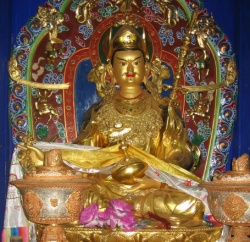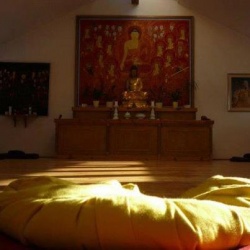Hāliddikāni Sutta: Hāliddikāni (2)
Saɱyutta Nikāya:
III. Khandhā Vagga:
22: Khandhāsaɱyutta
Sutta 4
Hāliddikāni Sutta (2)
Hāliddikāni (2)
Translated by F. L. Woodward
Edited by Mrs. Rhys Davids
Copyright The Pali Text Society
[1] THUS have I heard:—
Once the venerable Kaccāna the Great was staying among the folk of Avanti at Ospreys' Haunt
on a sheer mountain crag.
Then the housefather, Hāliddikāni came to the venerable Kaccāna the Great.
As he sat beside him,
the housefather Hāliddikāni said to the venerable Kaccāna the Great:
'Thus was it said, Master, by the Exalted One,
in the Questions of Sakka:[1]
"Those recluses and brahmins
who are freed by the utter destruction of craving,
they only are fully proficient,
they only have fully reached the infinite safety,
they only fully live the righteous life,
have fully reached the goal
— best of devas and men are they."[2]
Pray, Master, how should one regard
the full meaning of this concise saying
of the Exalted One?'
'As to the material element, housefather,
that desire,
that lust,
that lure,
that craving,
those system-graspings,
that mental standpoint,
that dogmatic bias
which is inherent therein
— it is by the destruction,
by the not lusting for,
by the cessation,
the giving up,
the utter surrender of those things
that the heart is called "fully freed."
Likewise as regards the feeling-element,
the perception-element,
the activities-element,
and the consciousness-element,
I repeat ... it is by the destruction of these,
the not lusting for these,
it is by the cessation,
the giving up,
the utter surrender of these things
that the heart is called "fully freed."
Thus, housefather, what was said by the Exalted One
in the Questions of Sakka, to wit:
"Those recluses and brahmins
who are freed by the utter destruction of craving,
they only are fully proficient,
they only have fully reached the infinite safety,
fully practise the righteous life,
have fully reached the goal
— best of devas and men are they"
— that is how one should regard the full meaning
of this concise saying of the Exalted One.'


